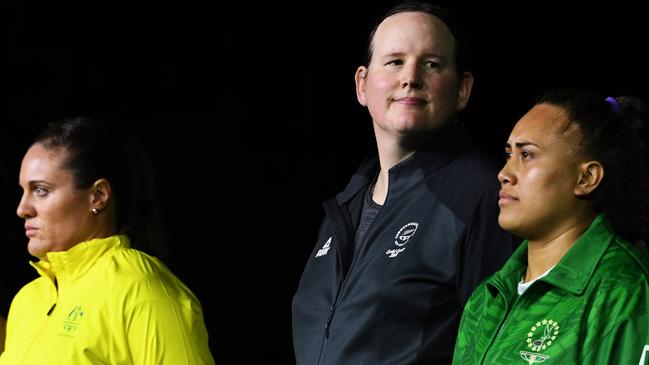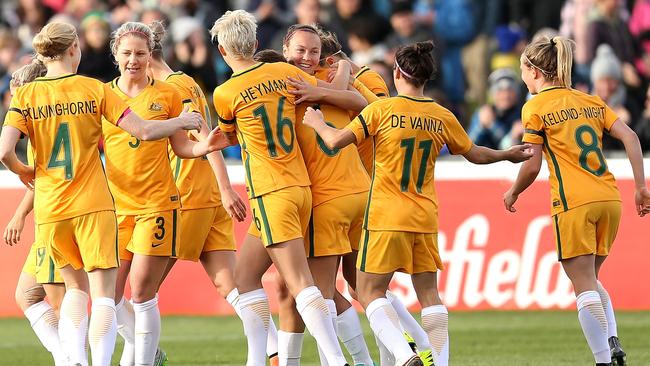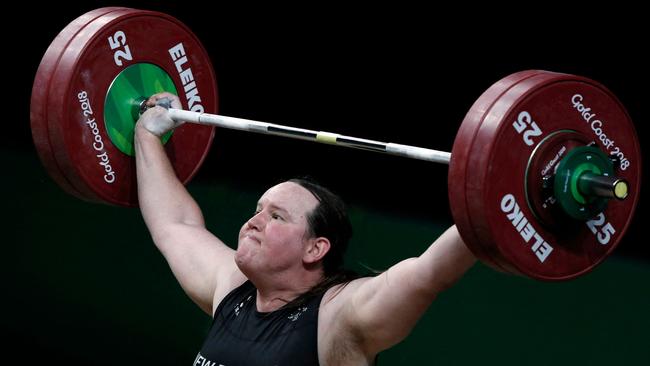Lucy Carne: There is nothing fair about Laurel Hubbard’s proposed inclusion in women’s Olympic weightlifting
That an athlete, who was up until 2012 a man, can compete in a women’s event based on strength makes a mockery of the Olympic spirit of fair play, writes Lucy Carne.
Opinion
Don't miss out on the headlines from Opinion. Followed categories will be added to My News.
Why should inclusivity outweigh fairness?
It’s a question that desperately needs answering with the announcement last week that Laurel Hubbard was set to become the first transgender athlete to compete at an Olympics.
The New Zealand Olympic Committee confirmed Ms Hubbard, who transitioned aged 35, was “very likely” to qualify for women’s weightlifting at the Tokyo Olympics.
It would make Hubbard, now aged 43, the oldest female Olympic superheavy weight competitor after El Salvador’s Eva Dimas, who competed aged 35 in 2008.

Supporters have applauded Ms Hubbard’s potential inclusion in the Olympics as a human rights victory, validating that trans women are real women.
But the announcement has ignited, once again, debate over whether biologically born – and matured – male bodies belong in women’s sport, particularly within individual events based on strength and force.
The International Olympic Committee thinks so. In 2015 it changed its rules to demand trans women athletes could qualify for the Olympics if they reduce testosterone levels to 10 nanomoles per litre of blood for a year, despite women having an “upper normal limit” of just 2.7 nanomoles per litre.
Scientists have criticised the testosterone requirements, saying it fails to eliminate the immense physical advantages men have over women.
A 2019 paper by the University of Otago and published in the peer-reviewed Journal of Medical Ethics stated that the “advantage to trans women afforded by the IOC guidelines is an intolerable unfairness”.
Men have been found to have greater lung capacity, bone density and greater type-two muscle fibre.
The British Journal of Sports Medicine published a report last year that found a year of reduced testosterone and increased oestrogen in trans women did little to mitigate their unfair competitive advantage against their female peers.
Then there is the anecdotal evidence. Who can forget when Australia national women’s soccer team the Matildas were defeated by an under-15 Newcastle boys team?

Or when Serena and Venus Williams took on the 203rd ranked male player Karsten Braasch, who prepped for the match with a few drinks and smokes and still beat Serena 6-1 and Venus 6-2.
British cricketer Maxine Blythin, who had a batting average of 15 playing against men, hit 124 competing against women.
Ms Hubbard, who lifted 300kg as a 20 year old before her transition, now lifts 285kg – 23 years later at an age when most women have retired from the sport.
Yet transgender cyclist Rachel McKinnon, now called Veronica Ivy, has said a trans person’s rights were more important than whether they had a performance advantage.
“We shouldn’t be worried about trans people taking over the Olympics. We should be worried about their fairness and human rights instead,” she said.
But at what loss to women’s sport?
Asked to comment on Hubbard’s potential Olympic selection, former Australian Olympic weightlifter Deborah Lovely Acason told me that women’s weightlifting “deserves and requires fairness”.
Ms Acason, a dual Olympian, five-time Commonwealth Games representative and medallist and former Australian Weightlifting Federation director, was the first female inducted into the AWF Hall of Fame.

She competed against Ms Hubbard, who she said weighed almost 50kg more than her, at the 2018 Commonwealth Games.
“After 52 years of waiting for women to earn the right to compete at our first Commonwealth Games in weightlifting and 104 years of waiting for women to be ‘allowed’ to compete at the Olympic Games, finally it happened. And now, only a short time later, a women’s right to compete in a (biological) women’s only category is again taken away,” she said.
Having witnessed teenage boys outlift her when she was training at an elite level, Ms Acason says her main concern is the impact it could have on attracting girls to the sport.
“It would be a very sad day in sport if girls won’t participate in certain sports for fear of getting hurt, or if they have to grow up resigned to the fact that they may have to compete against someone with such physical advantage over them,” she said.
Former Olympic weightlifter Tracey Lambrechs also said women were being told to “be quiet” if they raised concerns about the fairness of Hubbard competing in women’s competitions.
“We’re all about equality for women in sport but right now that equality is being taken away from us,” she said.
When Hubbard’s supporters demand it is her human right to compete, the question must be asked, what about the rights of her rival competitors?
That an athlete, who was up until 2012 a man, can compete in a women’s event based on strength makes a mockery of the Olympic spirit of “fair play”, as stated in the Olympic Charter.
Where is the fairness in that?





